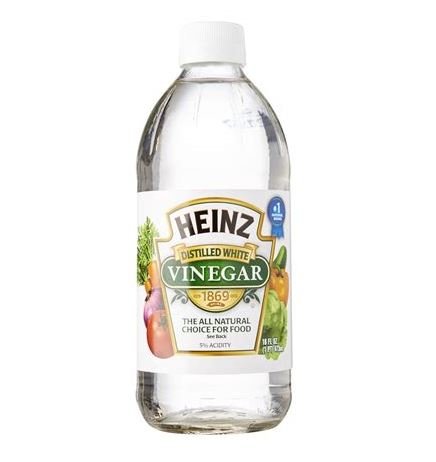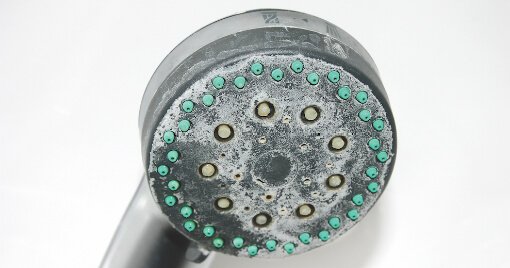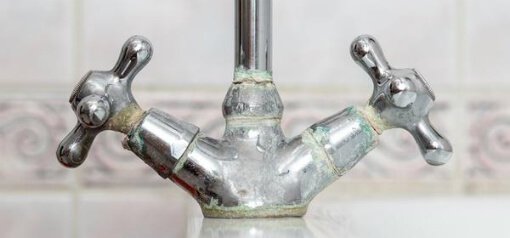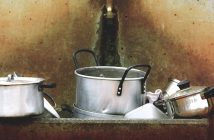It’s clear, it’s pungent and it will knock your socks off. The powerhouse, limescale-fighting, magical potion of your dreams has been hiding out in plain sight all this time.
It’s vinegar. 醋. Cù. Yep, boring, cheap, regular, old vinegar.

Tah-dahhhh!
Distilled white vinegar is the cheapest, most effective, and most ecologically-friendly way to deal with the limescale that plagues bathrooms all over Beijing. So you can stop buying products from the supermarket that promise to descale and clean your bathroom, but actually, just clean out your WeChat wallet instead. Here’s the lowdown:
Science me!
Tap water in Beijing (and all over China) is very high in minerals. Actually, it’s far from a China-exclusive problem. Minerally water like this is known as ‘hard water’ and occurs all over the world. As water from the tap evaporates from surfaces, it leaves behind mineral deposits. Over time, they build up on your faucets, shower glass, drains, and shower heads, creating a layer of crust that seems impossible to remove, and blocks water flow in the process.
Vinegar contains diluted acetic acid, which reacts with the calcium carbonate in this mineral buildup (limescale) to produce calcium acetate, which is soluble in water an easily washes away. This makes it your best friend when it comes to battling scale in the bathroom.
But what kind of vinegar, specifically?
Distilled white vinegar (白醋, bái cù) is best, but honestly, just about any kind of vinegar will do, even rice wine vinegar. As long as it contains acetic acid, it’ll work.
How to use it

Ain’t nobody getting clean from that
Soak your shower head – Unscrew the shower head, and soak it enough vinegar to cover it fully, for a couple of hours. If you can’t unscrew the head, lift it off the hook so it’s hanging down, pour vinegar into a strong plastic bag (or Ziploc), and tie it over the shower head. Take it out, give it a gentle scrub or just rub over the nozzles with your thumb, and you’re good to go. Repeat this every couple of weeks or whenever you notice the shower nozzles becoming blocked.
Clean your shower partition – Mix up a solution of equal parts filtered water and vinegar (plus a couple of drops of essential oil for fragrance, if you like) in a spray bottle. Shake to mix, then spray a fine layer over the glass. Have the fan running and perhaps cover your mouth while you do this. Vinegar isn’t toxic, but breathing in a lungful does sting a bit. Leave the vinegar to soak for a moment (but don’t leave it to dry), then wipe down with a sponge. Repeat if necessary, until all limescale is gone.
Rinse the vinegar off, then dry down the glass and enjoy how pristine it is… until your next shower. For really stubborn/long-term scale (like, nobody’s ever even tried to do this before), you may need to apply quite a lot of vinegar and scrub with a gentle abrasive to get it done. Repeat this spray-and-wipe every week to keep on top of the situation.

No one likes a green knob
Clean your chrome – Use the same spray solution on your chrome taps and handles. Simply spray on, wait a moment, then wipe off with a sponge. Shiny!
But wait, that’s not all!
Soften your fabrics – Vinegar makes a fantastic natural fabric softener. Dump about a cup in the fabric softener tray of your front loader, or pour in directly with your top-loader washing (even at the same time as the detergent, it seems to work fine). Once dry, your clothes will not smell vinegary (it dries odorless), and your duds will come out much softer than usual.
Disinfect your humidifier – Unplug and disassemble your humidifier. Rinse the filter with water (nothing else, as this can damage the filter) and set to dry. Wash out the tank and soak in vinegar. Reassemble the unit, but add a cup of vinegar to the water tank. Run the humidifier for an hour, rinse out the tank and fill with water as usual. You should do this once a week during times of heavy use.
These are just a couple of the best Beijing-hard-water specific uses for vinegar, but there are literally hundreds of applications such as:
– Descaling your kettle.
– Cleaning your coffee machine.
– Steaming the inside of your microwave.
– Removing streaks and smudges from your mirrors and windows.
– Improving your GPA (lol jk).
Just search ‘vinegar cleaning’ online for more but, and this is a big but, beware of recipes that call for a mixture of vinegar and baking soda. Individually, these are both very effective cleaning agents, but when mixed together they do bugger all, except fizz. But fizzing does not = cleaning. This fizzing is just the chemical reaction when baking soda (sodium bicarbonate) and vinegar (acetic acid) break down into sodium acetate, water, and carbon dioxide. Click here for more details on that.
Oh, and never mix vinegar with chlorine bleach or you’ll create deadly chlorine gas and kill us all.
Happy cleaning!
READ: Why the Bathroom in Your Chinese Apartment Smells Awful (And How to Fix It)
This post first appeared on our sister site, the Beijinger.
Images: The Spruce, singaporeplumbingworks.com




